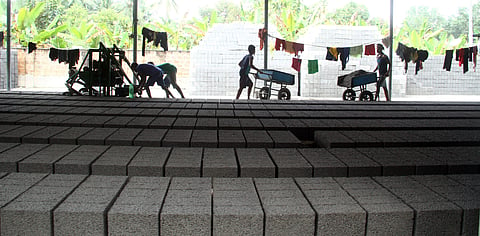

Researchers at the Indian Institute of Technology Madras (IIT Madras), have created a structured model to assist in the production of bio-cement, a sustainable alternative process for cementation. It has the potential to minimise carbon dioxide emissions in the future.
The process is termed Microbially Induced Calcite Precipitation (MICP) and is used to make bio-cement using bacteria (S pasteurii). The research was concentrated on gaining a better understanding of the MICP process with an extended aim to scale up the manufacturing of bio-cement.
Around 140 countries had pledged to reduce carbon dioxide emissions to achieve net-zero emissions during the UN Climate Change Conference which was held in Glasgow last year. Cement production is one of the most CO2 emitting industries. Developing alternative sustainable process for manufacturing cement to reduce emissions is very important and bio-cement could serve as a right move towards this direction.
Prof GK Suraishkumar, Department of Biotechnology; Dr Nirav Bhatt, Assistant Professor, Department of Biotechnology and Subasree Sridhar, Research Scholar led the IIT Madras Research team. The findings of their research were published in reputed peer-reviewed Biochemical Engineering Journal.
Using the bacteria, S pasteurii, the researchers studied the MICP process. They also proposed and developed a structured model for the complete ureolysis process in order to bolster the MICP process, which could serve as an alternative to manufacturing cement.
Explaining the practical applications of this research, Prof GK Suraishkumar, Faculty, Department of Biotechnology, IIT Madras, said, “The current applications are self-healing cement for sealing cracks in difficult-to-reach locations, consolidation of soil structures, removal of heavy metals and ‘radionuclides’ from drinking water, among others. A better understanding of the fundamental microbial processes such as overall ureolysis in the bio-cement formation could help us design and operate bioreactors for bio-cement production in the future to replace conventional cement for some applications.”
Further, highlighting the impact of this research, the professor said, “In the short term, the better understanding would help us provide optimal conditions for effective self-healing cement applications, and soil consolidation, among other applications. In the long term, the better understanding would help produce conventional cement equivalent through a bio-route.”
Microbially Induced Calcite Precipitation (MICP) is the process by which microorganisms form calcium carbonate precipitates, which are then used to make bio-cement. In the future, the developed structured model produced will be useful in establishing a unified model of ureolysis processes with calcite precipitation and MICP scale-up studies.
Speaking on the current status of this research, Dr Nirav Bhatt, Assistant Professor, Department of Biotechnology, IIT Madras, said, “MICP processes are currently modelled using unstructured models. Structured models of MICP provide better mechanistic insights into the bio-cementation process. Further, these models will be used in improving the process, rational process scale-up and optimisation in the future.
